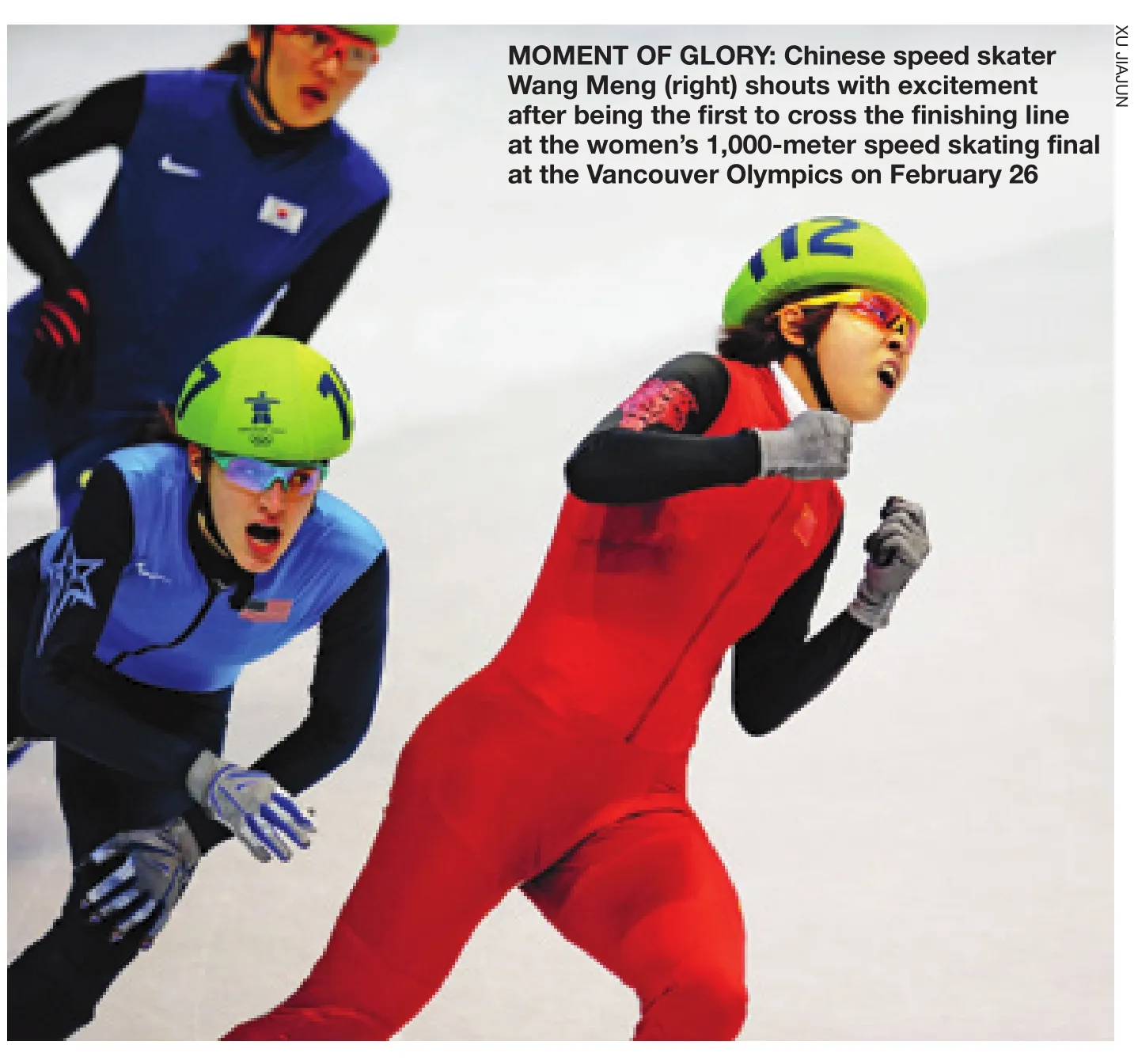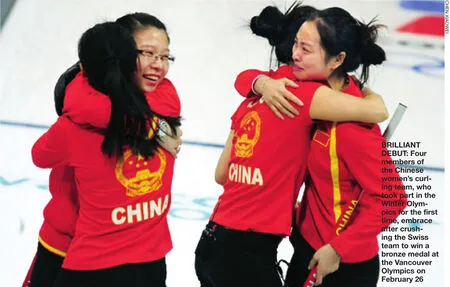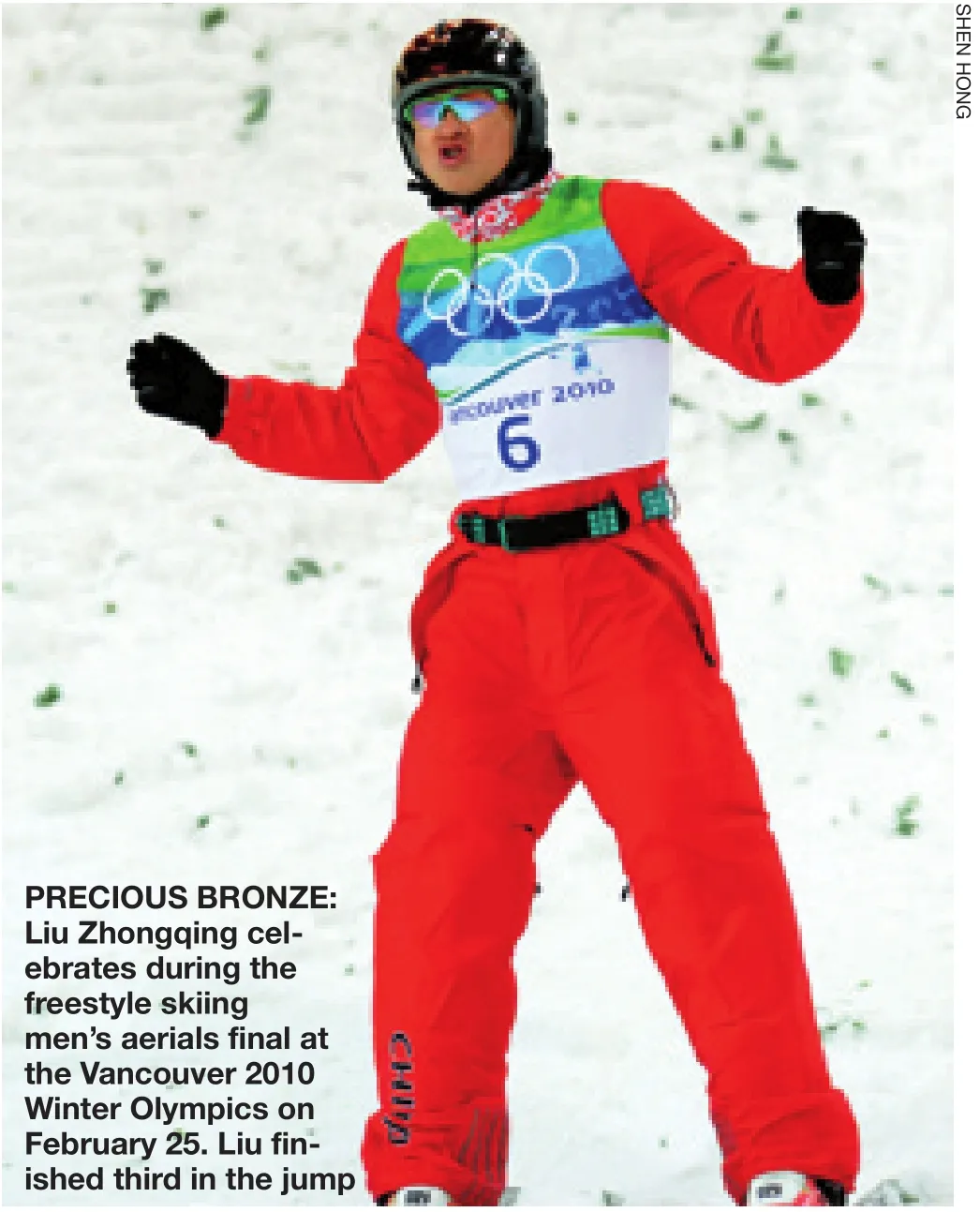On the Snow and Ice
Team China makes history at the Vancouver Winter Olympics amid concerns about a better performance at the next games
By LI XIAO
Providing its brilliant performance at the Vancouver Winter Olympics,Team China took home five gold,two silver and four bronze medals in short-track speed skating, figure skating,freestyle aerials and curling.
“China made historic breakthroughs in winter sports at the Vancouver Games,” said Xiao Tian, Deputy Chef-de-Mission of the Chinese Delegation, a day before the Games concluded on February 28. The country had consecutive two gold finishes in Salt Lake City in 2002 and Turin in 2006.
China sent its largest winter Olympic delegation to Vancouver, with 90 athletes taking part in the Games. China ranked seventh in the medal tally with 11 medals—the first time China entered the top eight.
In Vancouver, the Chinese broke two world and four Olympic records in ice, snow,individual, pairs, team and relay events.
In short-track speed skating, China swept the women’s events by grabbing all four gold medals. Twenty-four-year-old Wang Meng also became the first Chinese skater to win three golds at a single Winter Games. She successfully defended her women’s 500-meter title at 43.048 seconds,then led her team of Zhou Yang, Sun Linlin and Zhang Hui, to a dramatic victory in the women’s 3,000-meter relay after the fourtime Olympic champion South Korea was disquali fi ed for impeding. In the 1,000-meter,she fought a bad cold and tough rivals from the United States and South Korea to win her third gold.
Wang’s teammate Zhou made a perfect debut, beating three South Koreans to take the gold in the women’s 1,500-meter final,setting an Olympic record of 2 minutes and 16.993 seconds.
The Chinese men’s team fi nished fourth in the men’s 5,000-meter relay, concluding their Olympic journey without any medals.The young team’s impressive performance,however, is a foresight of things to come in future Winter Olympics.
In figure skating, the gold and silver medals in the pairs fi gure skating were pocketed by Shen Xue and Zhao Hongbo, and Pang Qing and Tong Jian.
Shen and Zhao have become the first ever non-European couple to win gold in Olympic pairs free skating history. The comeback pair also made history for China by winning China’s first gold for fi gure skating at Winter Olympics.
In freestyle aerials, although narrowly missing gold medals, the silver and bronze went to Li Nina and Guo Xinxin in the women’s category. Liu Zhongqing took the bronze in the men’s category.
Another two bronzes were awarded to the Chinese women’s curling team and Wang Beixing for the women’s 500-meter speed skating race.
Other Chinese who didn’t make it to the podium also shone in Vancouver as seven out of eight Chinese skiers advanced to the men’s and women’s finals in the freestyle aerials events. Liu Jiayu produced China’s best fourth-place fi nish in the snowboarding ladies’ halfpipe, making the Chinese hopeful of even better results at these events in Sochi,Russia, in four years.



Hard to exceed
Despite the more than positive results at these Games, China still has a long way to go in the development of winter sports in terms of people’s participation in winter sports.
The Vancouver Games also displayed China’s shortcomings in snow sports, despite such traditionally strong events as pair fi gure skating, women’s short-track speed skating and freestyle aerials.
“China has lagged far behind in figure skating powerhouses like the United States and Russia,” said Zhao Yinggang, Director of the Winter Sports Administrative Center and Secretary General of the Chinese Sports Delegation to Vancouver. “In terms of ice dancing and individual figure skating, Liu Yan ended up 19th in the women’s figure skating fi nal, and Huang Xintong and Zheng Xun failed to qualify in the top 10 in ice dancing.”
In ice hockey, one of the most popular sports of the Winter Olympics, the Chinese women’s team lost all its matches. The men’s team did not even make an appearance because they hadn’t qualified for the Vancouver Games. “That means we still have a large gap with the hockey powers such as Canada, which we cannot close up in a short time.”
Snow sports like alpine skiing and cross-country skiing, two sports China has made little progress in, are as important to the Winter Games as track and field to the Summer Games. “In alpine skiing, China only gained two quotas from the association.We are among the low-rankings in crosscountry skiing as well,” said Xiao.
Germany stood out, winning six gold,five silver and two bronze medals in alpine skiing. China won none.
Age is another problem facing Team China. China’s No.1 fi gure skating pair, 36-year-old Zhao and his 31-year-old wife Shen,will not attend the Sochi Winter Olympic Games. China’s triple Olympic gold medalist Wang Meng is also contemplating retirement after her brilliant triumph in Vancouver.
“Things always have a start and an end. I will certainly complete this season by taking part in the World Championships in March and then think about my future,” Wang said after winning her third gold. Head coach of China’s short-track speed skating team Li Yan, who led the squad to a grand slam fi nish, is thinking about returning to the United States after this season.
Two spiritual leaders of the women’s and men’s aerial teams, Li Nina and Han Xiaopeng, are also considering stepping down from the stage. Asked whether she would compete in her fourth Winter Olympics in 2014, the two-time runner-up Li commented on the possibility of retirement, “Can I trade these two silvers for one gold? It’s impossible for me to chase the gold without a fi nish line.I have done my best here in Vancouver.”
“It’s impossible for us to reach the same level as we have done in summer sports, but we will try to minimize the gap as much as we can,” Xiao said.
As for the preparation for the next Olympic Games, Zhao said that China will continue inviting foreign coaches and send its top athletes abroad.
Regarding personnel, Xiao indicated the Chinese Sports Delegation to Sochi in 2014 would not be scaled-up. “It’s a challenge for us to maintain the Vancouver glory. We cannot achieve the goal by enlarging our personnel. We’ll do more work in management and training in the next four years.”
Host Canada ranked first in the number of gold medals with 14 (plus seven silver and five bronze) after 17 days of thrilling competition. The United States placed first in the overall medal count with 37 (nine gold, 15 silver and 13 bronze), followed by Germany,with 30, and Canada, with 26. ■

